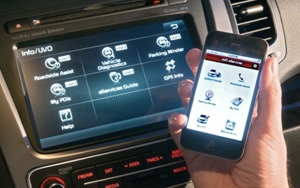automotive
Brands Should Listen, Not Talk (Too Much) In The Connected Car
- by Karl Greenberg , May 20, 2015
 Dan Hodges, CEO and founder of Consumers in Motion, offered up some connected-car context as moderator of a panel on the connected car at this week’s MediaPost Internet of Things:
Advertising conference. In the future the car will give brands access to the single most important good of the 20th century — private space and quality time. And with mapping, radar, 4G
capability, captured driver data and Bluetooth integration with smartphones, cars are already connected. The future is here. Even autonomous cars are here-and-now, with robo-taxis in the U.K.,
experiments today in the U.S. with self-driving cars and trucks. Apple, Uber, Tesla, and Google are some of the brands working with driverless cars. In 2016, BMW will launch its first driverless car
at scale.
Dan Hodges, CEO and founder of Consumers in Motion, offered up some connected-car context as moderator of a panel on the connected car at this week’s MediaPost Internet of Things:
Advertising conference. In the future the car will give brands access to the single most important good of the 20th century — private space and quality time. And with mapping, radar, 4G
capability, captured driver data and Bluetooth integration with smartphones, cars are already connected. The future is here. Even autonomous cars are here-and-now, with robo-taxis in the U.K.,
experiments today in the U.S. with self-driving cars and trucks. Apple, Uber, Tesla, and Google are some of the brands working with driverless cars. In 2016, BMW will launch its first driverless car
at scale.
advertisement
advertisement
Brian Hughes, SVP audience analysis practice at IPG Mediabrands, said the car is becoming another touchpoint in the digital consumer journey. But it's not the place where you want to be hit with branding the wrong way, or have people’s data compromised. Opt-in is key, agreed the panelists.
They also agreed that thinking of the car as a medium, strictly speaking, is a mistake, because that mindset is on marketing messages right now. Mark Figliulo, founder and CEO of Figliulo and Partners, said the key idea is using automotive data about a consumer — where and how he or she drives — and activating against it with other, complementary brands to create consumer value. “What they do to help my life as a driver will be the most important brand message they can send,” he says.
Figliulo said brands will progress in their understanding of the auto space by listening to the data the connected-car space creates. “They will take learnings about the way you drive, and what you need, and feed it back and make a better experience next time, that's the best use of data. And brands can use that data to form partnerships to reach like-minded people. If we know people better we can talk to them in a different way. Data is currency and we hoard it — you don't want to share too much. But I wish brands shared more data with consumers in a relevant way. It says to the consumer that the brand cares, and wants to form a relationship.”
He argued that the relationship should not be about hitting you in your car with an offer based on your location, but use of the data for time-shifted offers or consumer insight. “If you are driving, and your watch or your car knows where you are, and where you drive, brands might be able to use that data; but instead of hitting you in your car, maybe Home Depot is talking to my car. Later that weekend when I'm fixing the yard, I get pinged by Home Depot. How you use data that car is collecting will be really interesting.”
Ultimately, said Kinney Edwards, executive creative director at Tribal Worldwide, it's about listening. “What are the real need states for people. What's the opportunity, what are the gripes and what problems can be solved by brands [through the use of connected-car data]?”




